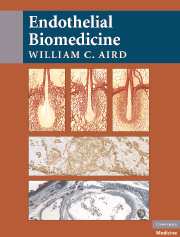Book contents
- Frontmatter
- Contents
- Editor, Associate Editors, Artistic Consultant, and Contributors
- Preface
- PART I CONTEXT
- 1 The Endothelium in History
- 2 Introductory Essay: Evolution, Comparative Biology, and Development
- 3 Evolution of Cardiovascular Systems and Their Endothelial Linings
- 4 The Evolution and Comparative Biology of Vascular Development and the Endothelium
- 5 Fish Endothelium
- 6 Hagfish: A Model for Early Endothelium
- 7 The Unusual Cardiovascular System of the Hemoglobinless Antarctic Icefish
- 8 The Fish Endocardium: A Review on the Teleost Heart
- 9 Skin Breathing in Amphibians
- 10 Avian Endothelium
- 11 Spontaneous Cardiovascular and Endothelial Disorders in Dogs and Cats
- 12 Giraffe Cardiovascular Adaptations to Gravity
- 13 Energy Turnover and Oxygen Transport in the Smallest Mammal: The Etruscan Shrew
- 14 Molecular Phylogeny
- 15 Darwinian Medicine: What Evolutionary Medicine Offers to Endothelium Researchers
- 16 The Ancestral Biomedical Environment
- 17 Putting Up Resistance: Maternal–Fetal Conflict over the Control of Uteroplacental Blood Flow
- 18 Xenopus as a Model to Study Endothelial Development and Modulation
- 19 Vascular Development in Zebrafish
- 20 Endothelial Cell Differentiation and Vascular Development in Mammals
- 21 Fate Mapping
- 22 Pancreas and Liver: Mutual Signaling during Vascularized Tissue Formation
- 23 Pulmonary Vascular Development
- 24 Shall I Compare the Endothelium to a Summer's Day: The Role of Metaphor in Communicating Science
- 25 The Membrane Metaphor: Urban Design and the Endothelium
- 26 Computer Metaphors for the Endothelium
- PART II ENDOTHELIAL CELL AS INPUT-OUTPUT DEVICE
- PART III VASCULAR BED/ORGAN STRUCTURE AND FUNCTION IN HEALTH AND DISEASE
- PART IV DIAGNOSIS AND TREATMENT
- PART V CHALLENGES AND OPPORTUNITIES
- Index
- Plate section
11 - Spontaneous Cardiovascular and Endothelial Disorders in Dogs and Cats
from PART I - CONTEXT
Published online by Cambridge University Press: 04 May 2010
- Frontmatter
- Contents
- Editor, Associate Editors, Artistic Consultant, and Contributors
- Preface
- PART I CONTEXT
- 1 The Endothelium in History
- 2 Introductory Essay: Evolution, Comparative Biology, and Development
- 3 Evolution of Cardiovascular Systems and Their Endothelial Linings
- 4 The Evolution and Comparative Biology of Vascular Development and the Endothelium
- 5 Fish Endothelium
- 6 Hagfish: A Model for Early Endothelium
- 7 The Unusual Cardiovascular System of the Hemoglobinless Antarctic Icefish
- 8 The Fish Endocardium: A Review on the Teleost Heart
- 9 Skin Breathing in Amphibians
- 10 Avian Endothelium
- 11 Spontaneous Cardiovascular and Endothelial Disorders in Dogs and Cats
- 12 Giraffe Cardiovascular Adaptations to Gravity
- 13 Energy Turnover and Oxygen Transport in the Smallest Mammal: The Etruscan Shrew
- 14 Molecular Phylogeny
- 15 Darwinian Medicine: What Evolutionary Medicine Offers to Endothelium Researchers
- 16 The Ancestral Biomedical Environment
- 17 Putting Up Resistance: Maternal–Fetal Conflict over the Control of Uteroplacental Blood Flow
- 18 Xenopus as a Model to Study Endothelial Development and Modulation
- 19 Vascular Development in Zebrafish
- 20 Endothelial Cell Differentiation and Vascular Development in Mammals
- 21 Fate Mapping
- 22 Pancreas and Liver: Mutual Signaling during Vascularized Tissue Formation
- 23 Pulmonary Vascular Development
- 24 Shall I Compare the Endothelium to a Summer's Day: The Role of Metaphor in Communicating Science
- 25 The Membrane Metaphor: Urban Design and the Endothelium
- 26 Computer Metaphors for the Endothelium
- PART II ENDOTHELIAL CELL AS INPUT-OUTPUT DEVICE
- PART III VASCULAR BED/ORGAN STRUCTURE AND FUNCTION IN HEALTH AND DISEASE
- PART IV DIAGNOSIS AND TREATMENT
- PART V CHALLENGES AND OPPORTUNITIES
- Index
- Plate section
Summary
Cardiovascular disease is common in both dogs and cats, although few efforts have been made to identify the roles that endothelial dysfunction plays in these diseases. Although cardiovascular diseases such as myocardial, pericardial, and valvular heart diseases are a frequent cause of disability in companion animals, atherosclerotic coronary artery disease is almost nonexistent in companion animal species. Tests commonly used to characterize cardiovascular disease in clinical veterinary medicine include history, physical examination including auscultation, direct and indirect blood pressure measurement, thoracic radiography, electrocardiography, and echocardiography. Echocardiographic techniques include two-dimensional, M-mode, spectral Doppler, and color-flow Doppler echocardiography. Specific clinical tests to evaluate endothelial function, such as flow-mediated vasodilation and venous plethysmography, commonly are not used, and normal values have yet to be published for clinical application in dogs and cats. Preliminary investigations into the biochemical markers that may reflect endothelial dysfunction in certain diseases have been reported for certain cardiovascular disorders; however, these tests are not used in clinical practice. Although the study of endothelial function in veterinary patients is still in its infancy, many investigators believe that endothelial dysfunction is associated with the common cardiovascular disorders in dogs and cats. This chapter approaches the topic from a brief review of the common cardiovascular diseases in dogs and cats with an accompanying summary of information related to endothelial function.
COMMON SPONTANEOUS CARDIOVASCULAR AND ENDOTHELIAL DISEASE IN DOGS
Chronic Valvular Heart Disease
Chronic valvular heart disease is the most common cardiovascular disease in dogs and is the most common cause of congestive heart failure (CHF) (1). Chronic valvular heart disease is most analogous to the floppy mitral valve syndrome in humans, and it is a progressive, degenerative disorder of the valve.
- Type
- Chapter
- Information
- Endothelial Biomedicine , pp. 94 - 98Publisher: Cambridge University PressPrint publication year: 2007



